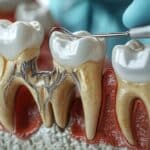In the realm of oral health, bad breath or halitosis is often dismissed as a temporary annoyance. However, what many individuals fail to realize is that persistent bad breath could be a warning sign of a deeper issue:periodontal disease, commonly referred to as gum disease. In this comprehensive guide, we dive into the intricate link between bad breath and periodontal disease, exploring the symptoms, implications, and preventive measures to maintain a healthy smile. We also discuss the treatment options for those whose gum disease has advanced to the point of causing tooth failure and even damage to the underlying jawbone.
Understanding Periodontal Disease: A Silent Threat to Oral Health
Periodontal disease, characterized by serious inflammation and infection of the gums and surrounding tissues, poses a significant threat to oral health. The condition typically progresses in stages, starting with gingivitis, where the gums become inflamed and prone to bleeding, and advancing to periodontitis, where irreversible damage to the supporting bone and tissues occurs. Left untreated, periodontal disease can always lead to tooth loss and systemic health issues, making early detection and intervention paramount.
In fact, advanced periodontal disease is the No. 1 cause of missing and failing teeth that we see at New Teeth Now. Although disease prevention is always the best approach, we take pride in helping many patients with advanced gum disease and failing teeth regain their beautiful smiles and oral health through our customized full mouth dental implant process that emphasizes convenience and the highest level of patient care.
The Link Between Bad Breath and Periodontal Disease
While occasional bad breath may result from dietary choices or temporary factors, chronic bad breath often signifies an underlying problem, such as periodontal disease. The primary culprit behind persistent halitosis in cases of gum disease is the proliferation of oral bacteria. These bacteria thrive in the plaque and tartar deposits that accumulate along the gum line, releasing foul-smelling gases as byproducts of their metabolic processes. When this happens, bad breath becomes a telltale symptom of the underlying gum infection.
Recognizing Gum Disease Symptoms: Beyond Bad Breath

While bad breath is a prominent indicator, periodontal disease manifests through an array of symptoms, including:
- Bleeding gums – Healthy gums should ideally not bleed during brushing or flossing. If you notice persistent bleeding, it could signal gum inflammation and the early stages of periodontal disease.
- Gum recession – As periodontal disease progresses, the gums may recede, exposing the tooth roots and creating pockets where bacteria can thrive.
- Loose teeth – Advanced periodontitis can lead to the deterioration of the supporting bone, causing teeth to become loose or unstable.
- Gum sensitivity – Increased sensitivity or tenderness in the gums, especially when chewing or brushing, may indicate underlying gum disease.
- Persistent bad taste – Individuals with periodontal disease may experience a persistent unpleasant taste in the mouth, even after brushing and rinsing.
Tips for a Healthy Smile: Preventing Periodontal Disease

Preventing periodontal disease and keeping optimal oral health requires a proactive approach. Here are some tips for promoting a healthy smile and preventing the onset of gum disease:
- Maintain proper oral hygiene – Always brush your teeth at least two times a day and floss each day to remove plaque from between the teeth and along the gumline.
- Schedule regular dental checkups – Routine dental visits allow your dentist to check your oral health, detect early symptoms of gum disease, and provide timely intervention.
- Limit sugary and processed foods – A diet high in sugary and processed foods contributes to plaque buildup and enhances the risk of gum disease. Opt for a balanced diet full of fruits, vegetables, and lean proteins.
- Avoid tobacco products – Smoking and tobacco use not only stain the teeth but also increase the risk of gum disease and various other oral health issues. Quitting tobacco is essential for maintaining gum health.
- Stay hydrated – Drinking plenty of water stimulates saliva production, which plays a crucial role in rinsing away food particles and other bacteria from the mouth.
- Get professional cleanings – Regular professional cleanings by a dental hygienist can eliminate stubborn plaque and tartar buildup, reducing the risk of gum disease.
Treating Gum Disease that Has Gone Too Far
If you’re one of the many people with advanced periodontal disease, you can still take steps to protect your teeth and oral health. Depending on what stage of gum disease you have, you may be able to prevent further damage by getting deep dental cleanings, also known as scaling and planing. Unlike regular professional teeth cleanings, this treatment—typically available at dentist’s offices—targets the bacteria that lurks below the gum line, attacking both gum tissue and the underlying jawbone.
For many people, though, periodontal disease has progressed to the point that their teeth are so loose they can no longer chew or bite into food confidently. Their advanced gum disease may have caused them to lose multiple teeth in the upper or lower arch, or both. In these cases, replacing the teeth with dental implants might be the best solution.
The world-renowned dental implant specialists at New Teeth Now offer a time-tested, one-and-done procedure that treats even the most severe cases of gum disease at the same time that the patient’s teeth are replaced with long-lasting implants and natural-looking teeth. We do this by removing all of the bacteria-infected tissue before placing our titanium implants. Using this process, our board-certified and highly experienced oral surgeons have restored the beautiful smiles and oral health of thousands of patients—even those who were told they couldn’t get dental implants due to extensive bone loss.

In most cases, we can even outfit bone loss patients with a full set of implant-supported tooth prosthetics without the need for time-consuming bone-grafting procedures, which can delay the dental restoration process by weeks or months.
Say Good-bye to Periodontal Disease
Bad breath can be a sign of periodontal disease, but it’s hardly the biggest threat to your health and well-being. Living with loose and missing teeth will undoubtedly affect your outlook on life as well as your general health, as you choose less nutritious foods that are easy to chew and avoid healthy options like apples, carrots, and other fruits and vegetables. Moreover, the bacterial infections that cause gum disease have been linked to serious health conditions, including heart disease, diabetes, and even some forms of cancer.
If you’ve been struggling with tooth loss due to advanced periodontal disease or some other cause, New Teeth Now is here to help. Our caring and experienced team will be happy to discuss your condition and help you determine whether our dental implant services are right for you. We’ll also tell you more about how we’ve perfected the dental implantation process, so that the New Teeth Now patient experience and results outshine other treatment options.
Are you ready to start over with a full set of new teeth and healthy gums? Take the first step today by scheduling a consultation at the New Teeth Now location that’s most convenient for you.









